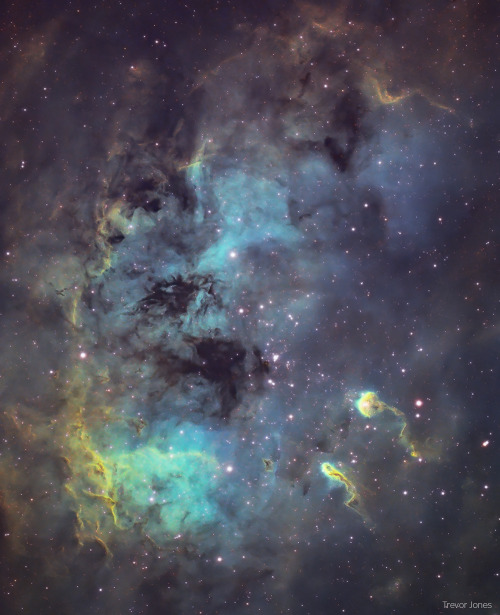Chaos Theory, The Principles Underpinning Certain Nonlinear Equations, Also Requires Us To Adopt A Probabilistic
Chaos theory, the principles underpinning certain nonlinear equations, also requires us to adopt a probabilistic description of many natural phenomena. The sizes and orbital positions of the planets in our solar system, for example, depend sensitively on the starting condition for solar system formation. If we ran the creation experiment again with slightly different parameters, we would get a different collection of planets with different orbital characteristics. But the results are not purely random. If we produced thousands of solar systems, again with similar but not exactly the same starting conditions, we would obtain a well-defined distribution of planet properties and planetary orbits. Although we cannot make exact predictions for any particular experiment, in principle we can determine the odds of getting any one type of planet or solar system. This intricate interplay between chance and determinism occurs throughout our physical universe and can even be applied to the consideration of how, and in what form, life can evolve.
Fred Adams, ‘Origins Of Existence: How Life Emerged In The Universe’ (2002)

(via sagansense)
More Posts from Epic-flight and Others

Young Stars of NGC 346 : The massive stars of NGC 346 are short lived, but very energetic. The star cluster is embedded in the largest star forming region in the Small Magellanic Cloud, some 210,000 light-years distant. Their winds and radiation sweep out an interstellar cavern in the gas and dust cloud about 200 light-years across, triggering star formation and sculpting the region’s dense inner edge. Cataloged as N66, the star forming region also appears to contain a large population of infant stars. A mere 3 to 5 million years old and not yet burning hydrogen in their cores, the infant stars are strewn about the embedded star cluster. In this false-color Hubble Space Telescope image, visible and near-infrared light are seen as blue and green, while light from atomic hydrogen emission is red. via NASA

Earth, Moon, and Sun, painted by Chesley Bonestell, printed in Future Life, April 1978.

Jupiter grom Ganymede - Vadim Sadovski




🟣Moon Wish 🟣

Star Tunnel - 220319

The Tadpoles of IC 410 : This telescopic close-up shows off the central regions of otherwise faint emission nebula IC 410, captured under backyard suburban skies with narrowband filters. It also features two remarkable inhabitants of the cosmic pond of gas and dust. Below and right of center are the tadpoles of IC 410. Partly obscured by foreground dust, the nebula itself surrounds NGC 1893, a young galactic cluster of stars. Formed in the interstellar cloud a mere 4 million years ago, the intensely hot, bright cluster stars energize the glowing gas. Composed of denser cooler gas and dust, the tadpoles are around 10 light-years long and are likely sites of ongoing star formation. Sculpted by stellar winds and radiation their heads are outlined by bright ridges of ionized gas while their tails trail away from the cluster’s central young stars. IC 410 lies some 10,000 light-years away, toward the nebula-rich constellation Auriga. via NASA

Scorpius Rising, photographed from Mt. Laguna, California. (Hendren Imaging)



2014 | Interstellar | Official Concept Art | Source: “Interstellar: Beyond Time and Space” Book by Mark Cotta Vaz

Ghost Form.
-
 epic-flight reblogged this · 4 years ago
epic-flight reblogged this · 4 years ago -
 scienceoldguy reblogged this · 4 years ago
scienceoldguy reblogged this · 4 years ago -
 twentyearstomidnight reblogged this · 4 years ago
twentyearstomidnight reblogged this · 4 years ago -
 twentyearstomidnight liked this · 4 years ago
twentyearstomidnight liked this · 4 years ago -
 siriuslygabi reblogged this · 4 years ago
siriuslygabi reblogged this · 4 years ago -
 siriuslygabi liked this · 4 years ago
siriuslygabi liked this · 4 years ago -
 panzerneck liked this · 4 years ago
panzerneck liked this · 4 years ago -
 awittledragon liked this · 4 years ago
awittledragon liked this · 4 years ago -
 mindlessmuffdiver liked this · 4 years ago
mindlessmuffdiver liked this · 4 years ago -
 thinkveganworld reblogged this · 4 years ago
thinkveganworld reblogged this · 4 years ago -
 thinkveganworld liked this · 4 years ago
thinkveganworld liked this · 4 years ago -
 witch-day-is-it liked this · 4 years ago
witch-day-is-it liked this · 4 years ago -
 abetterm0use liked this · 4 years ago
abetterm0use liked this · 4 years ago -
 quidalle reblogged this · 4 years ago
quidalle reblogged this · 4 years ago -
 quidalle liked this · 4 years ago
quidalle liked this · 4 years ago -
 joeldirtybastard liked this · 4 years ago
joeldirtybastard liked this · 4 years ago -
 ruby-skylark liked this · 4 years ago
ruby-skylark liked this · 4 years ago -
 divermarv reblogged this · 4 years ago
divermarv reblogged this · 4 years ago -
 divermarv liked this · 4 years ago
divermarv liked this · 4 years ago -
 sagansense reblogged this · 4 years ago
sagansense reblogged this · 4 years ago

